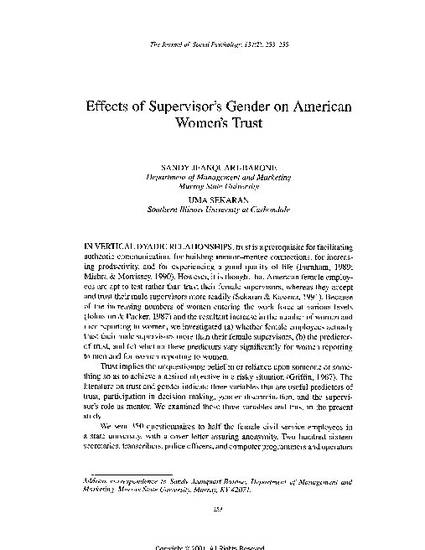
Article
Effects of Supervisor's Gender on American Women's Trust
Journal of Social Psychology
(1994)
Abstract
The article looks at whether female employees trust their male supervisors more than their female supervisors and investigates the predictors of trust and whether these predictors vary significantly for women reporting to men and for women reporting to women. In vertical dyadic relationships, trust is a prerequisite for facilitating authentic communication, for building mentor-mentee connections, for increasing productivity, and for experiencing a good quality of life. Trust implies the unquestioning belief in or reliance upon someone or something so as to achieve a desired objective in a risky situation. The literature on trust and gender indicate three variables that are useful predictors of trust, participation in decision making, gender discrimination, and the supervisor's role as mentor. The study indicates that the women reporting to women trusted their supervisors significantly less than the women reporting to men did. Because trust has been found to affect individual and organizational outcomes, such as quality of life and productivity, enhancing the level of trust in the American labor force (in which the majority of new entrants are predicted to be women) is a major concern.
Keywords
- Women employees,
- Trust,
- Supervisors,
- Mentoring,
- Interpersonal relations,
- Problem solving
Disciplines
Publication Date
April, 1994
Citation Information
Sandy Jeanquart-Barone and Uma Sekaran. "Effects of Supervisor's Gender on American Women's Trust" Journal of Social Psychology Vol. 134 Iss. 2 (1994) p. 253 - 255 ISSN: 0022-4545 Available at: http://works.bepress.com/sandy-miles/18/
